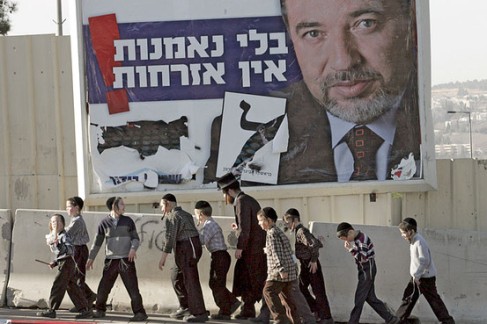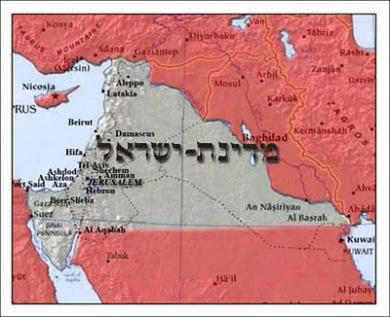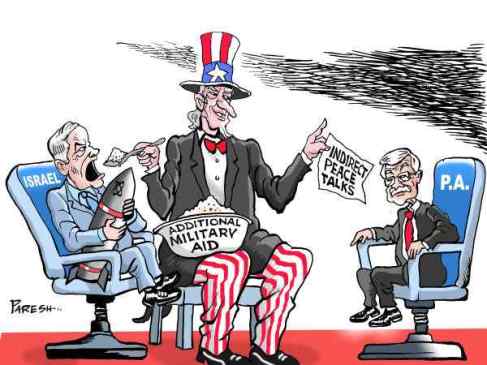By Andrew higgins
Moshav Tekuma, Israel
Surveying the wreckage of a neighbor’s bungalow hit by a Palestinian rocket, retired Israeli official Avner Cohen traces the missile’s trajectory back to an “enormous, stupid mistake” made 30 years ago.
“Hamas, to my great regret, is Israel’s creation,” says Mr. Cohen, a Tunisian-born Jew who worked in Gaza for more than two decades. Responsible for religious affairs in the region until 1994, Mr. Cohen watched the Islamist movement take shape, muscle aside secular Palestinian rivals and then morph into what is today Hamas, a militant group that is sworn to Israel’s destruction.
Instead of trying to curb Gaza’s Islamists from the outset, says Mr. Cohen, Israel for years tolerated and, in some cases, encouraged them as a counterweight to the secular nationalists of the Palestine Liberation Organization and its dominant faction, Yasser Arafat’s Fatah. Israel cooperated with a crippled, half-blind cleric named Sheikh Ahmed Yassin, even as he was laying the foundations for what would become Hamas. Sheikh Yassin continues to inspire militants today; during the recent war in Gaza, Hamas fighters confronted Israeli troops with “Yassins,” primitive rocket-propelled grenades named in honor of the cleric.
![[SB123274679298211283]](https://i0.wp.com/s.wsj.net/public/resources/images/OB-CZ922_WHAMAS_D_20090123171458.jpg)
Sheikh Ahmed Yassin, the founder of Hamas.
Last Saturday, after 22 days of war, Israel announced a halt to the offensive. The assault was aimed at stopping Hamas rockets from falling on Israel. Prime Minister Ehud Olmert hailed a “determined and successful military operation.” More than 1,200 Palestinians had died. Thirteen Israelis were also killed.
Hamas responded the next day by lobbing five rockets towards the Israeli town of Sderot, a few miles down the road from Moshav Tekuma, the farming village where Mr. Cohen lives. Hamas then announced its own cease-fire.
Since then, Hamas leaders have emerged from hiding and reasserted their control over Gaza. Egyptian-mediated talks aimed at a more durable truce are expected to start this weekend. President Barack Obama said this week that lasting calm “requires more than a long cease-fire” and depends on Israel and a future Palestinian state “living side by side in peace and security.”
A look at Israel’s decades-long dealings with Palestinian radicals — including some little-known attempts to cooperate with the Islamists — reveals a catalog of unintended and often perilous consequences. Time and again, Israel’s efforts to find a pliant Palestinian partner that is both credible with Palestinians and willing to eschew violence, have backfired. Would-be partners have turned into foes or lost the support of their people.
Israel’s experience echoes that of the U.S., which, during the Cold War, looked to Islamists as a useful ally against communism. Anti-Soviet forces backed by America after Moscow’s 1979 invasion of Afghanistan later mutated into al Qaeda.
![[Hamas supporters in Gaza City after the cease-fire.]](https://i0.wp.com/si.wsj.net/public/resources/images/PT-AK751_HAMAS__D_20090123151839.jpg) Hamas supporters in Gaza City after the cease-fire.
Hamas supporters in Gaza City after the cease-fire.
At stake is the future of what used to be the British Mandate of Palestine, the biblical lands now comprising Israel and the Palestinian territories of the West Bank and Gaza. Since 1948, when the state of Israel was established, Israelis and Palestinians have each asserted claims over the same territory.
The Palestinian cause was for decades led by the PLO, which Israel regarded as a terrorist outfit and sought to crush until the 1990s, when the PLO dropped its vow to destroy the Jewish state. The PLO’s Palestinian rival, Hamas, led by Islamist militants, refused to recognize Israel and vowed to continue “resistance.” Hamas now controls Gaza, a crowded, impoverished sliver of land on the Mediterranean from which Israel pulled out troops and settlers in 2005.
When Israel first encountered Islamists in Gaza in the 1970s and ’80s, they seemed focused on studying the Quran, not on confrontation with Israel. The Israeli government officially recognized a precursor to Hamas called Mujama Al-Islamiya, registering the group as a charity. It allowed Mujama members to set up an Islamic university and build mosques, clubs and schools. Crucially, Israel often stood aside when the Islamists and their secular left-wing Palestinian rivals battled, sometimes violently, for influence in both Gaza and the West Bank.
“When I look back at the chain of events I think we made a mistake,” says David Hacham, who worked in Gaza in the late 1980s and early ’90s as an Arab-affairs expert in the Israeli military. “But at the time nobody thought about the possible results.”
Israeli officials who served in Gaza disagree on how much their own actions may have contributed to the rise of Hamas. They blame the group’s recent ascent on outsiders, primarily Iran. This view is shared by the Israeli government. “Hamas in Gaza was built by Iran as a foundation for power, and is backed through funding, through training and through the provision of advanced weapons,” Mr. Olmert said last Saturday. Hamas has denied receiving military assistance from Iran.
Arieh Spitzen, the former head of the Israeli military’s Department of Palestinian Affairs, says that even if Israel had tried to stop the Islamists sooner, he doubts it could have done much to curb political Islam, a movement that was spreading across the Muslim world. He says attempts to stop it are akin to trying to change the internal rhythms of nature: “It is like saying: ‘I will kill all the mosquitoes.’ But then you get even worse insects that will kill you…You break the balance. You kill Hamas you might get al Qaeda.”
When it became clear in the early 1990s that Gaza’s Islamists had mutated from a religious group into a fighting force aimed at Israel — particularly after they turned to suicide bombings in 1994 — Israel cracked down with ferocious force. But each military assault only increased Hamas’s appeal to ordinary Palestinians. The group ultimately trounced secular rivals, notably Fatah, in a 2006 election supported by Israel’s main ally, the U.S.
Now, one big fear in Israel and elsewhere is that while Hamas has been hammered hard, the war might have boosted the group’s popular appeal. Ismail Haniyeh, head of the Hamas administration in Gaza, came out of hiding last Sunday to declare that “God has granted us a great victory.”
Most damaged from the war, say many Palestinians, is Fatah, now Israel’s principal negotiating partner. “Everyone is praising the resistance and thinks that Fatah is not part of it,” says Baker Abu-Baker, a longtime Fatah supporter and author of a book on Hamas.
A Lack of Devotion
Hamas traces its roots back to the Muslim Brotherhood, a group set up in Egypt in 1928. The Brotherhood believed that the woes of the Arab world spring from a lack of Islamic devotion. Its slogan: “Islam is the solution. The Quran is our constitution.” Its philosophy today underpins modern, and often militantly intolerant, political Islam from Algeria to Indonesia.
After the 1948 establishment of Israel, the Brotherhood recruited a few followers in Palestinian refugee camps in Gaza and elsewhere, but secular activists came to dominate the Palestinian nationalist movement.
At the time, Gaza was ruled by Egypt. The country’s then-president, Gamal Abdel Nasser, was a secular nationalist who brutally repressed the Brotherhood. In 1967, Nasser suffered a crushing defeat when Israel triumphed in the six-day war. Israel took control of Gaza and also the West Bank.
“We were all stunned,” says Palestinian writer and Hamas supporter Azzam Tamimi. He was at school at the time in Kuwait and says he became close to a classmate named Khaled Mashaal, now Hamas’s Damascus-based political chief. “The Arab defeat provided the Brotherhood with a big opportunity,” says Mr. Tamimi.
In Gaza, Israel hunted down members of Fatah and other secular PLO factions, but it dropped harsh restrictions imposed on Islamic activists by the territory’s previous Egyptian rulers. Fatah, set up in 1964, was the backbone of the PLO, which was responsible for hijackings, bombings and other violence against Israel. Arab states in 1974 declared the PLO the “sole legitimate representative” of the Palestinian people world-wide.
A poster of the late Sheikh Yassin hangs near a building destroyed by the Israeli assault on Gaza.
The Muslim Brotherhood, led in Gaza by Sheikh Yassin, was free to spread its message openly. In addition to launching various charity projects, Sheikh Yassin collected money to reprint the writings of Sayyid Qutb, an Egyptian member of the Brotherhood who, before his execution by President Nasser, advocated global jihad. He is now seen as one of the founding ideologues of militant political Islam.
Mr. Cohen, who worked at the time for the Israeli government’s religious affairs department in Gaza, says he began to hear disturbing reports in the mid-1970s about Sheikh Yassin from traditional Islamic clerics. He says they warned that the sheikh had no formal Islamic training and was ultimately more interested in politics than faith. “They said, ‘Keep away from Yassin. He is a big danger,'” recalls Mr. Cohen.
Instead, Israel’s military-led administration in Gaza looked favorably on the paraplegic cleric, who set up a wide network of schools, clinics, a library and kindergartens. Sheikh Yassin formed the Islamist group Mujama al-Islamiya, which was officially recognized by Israel as a charity and then, in 1979, as an association. Israel also endorsed the establishment of the Islamic University of Gaza, which it now regards as a hotbed of militancy. The university was one of the first targets hit by Israeli warplanes in the recent war.
Brig. General Yosef Kastel, Gaza’s Israeli governor at the time, is too ill to comment, says his wife. But Brig. Gen. Yitzhak Segev, who took over as governor in Gaza in late 1979, says he had no illusions about Sheikh Yassin’s long-term intentions or the perils of political Islam. As Israel’s former military attache in Iran, he’d watched Islamic fervor topple the Shah. However, in Gaza, says Mr. Segev, “our main enemy was Fatah,” and the cleric “was still 100% peaceful” towards Israel. Former officials say Israel was also at the time wary of being viewed as an enemy of Islam.
Mr. Segev says he had regular contact with Sheikh Yassin, in part to keep an eye on him. He visited his mosque and met the cleric around a dozen times. It was illegal at the time for Israelis to meet anyone from the PLO. Mr. Segev later arranged for the cleric to be taken to Israel for hospital treatment. “We had no problems with him,” he says.
In fact, the cleric and Israel had a shared enemy: secular Palestinian activists. After a failed attempt in Gaza to oust secularists from leadership of the Palestinian Red Crescent, the Muslim version of the Red Cross, Mujama staged a violent demonstration, storming the Red Crescent building. Islamists also attacked shops selling liquor and cinemas. The Israeli military mostly stood on the sidelines.
Mr. Segev says the army didn’t want to get involved in Palestinian quarrels but did send soldiers to prevent Islamists from burning down the house of the Red Crescent’s secular chief, a socialist who supported the PLO.
‘An Alternative to the PLO’
Clashes between Islamists and secular nationalists spread to the West Bank and escalated during the early 1980s, convulsing college campuses, particularly Birzeit University, a center of political activism.
As the fighting between rival student factions at Birzeit grew more violent, Brig. Gen. Shalom Harari, then a military intelligence officer in Gaza, says he received a call from Israeli soldiers manning a checkpoint on the road out of Gaza. They had stopped a bus carrying Islamic activists who wanted to join the battle against Fatah at Birzeit. “I said: ‘If they want to burn each other let them go,'” recalls Mr. Harari.
A leader of Birzeit’s Islamist faction at the time was Mahmoud Musleh, now a pro-Hamas member of a Palestinian legislature elected in 2006. He recalls how usually aggressive Israeli security forces stood back and let conflagration develop. He denies any collusion between his own camp and the Israelis, but says “they hoped we would become an alternative to the PLO.”
A year later, in 1984, the Israeli military received a tip-off from Fatah supporters that Sheikh Yassin’s Gaza Islamists were collecting arms, according to Israeli officials in Gaza at the time. Israeli troops raided a mosque and found a cache of weapons. Sheikh Yassin was jailed. He told Israeli interrogators the weapons were for use against rival Palestinians, not Israel, according to Mr. Hacham, the military affairs expert who says he spoke frequently with jailed Islamists. The cleric was released after a year and continued to expand Mujama’s reach across Gaza.
Around the time of Sheikh Yassin’s arrest, Mr. Cohen, the religious affairs official, sent a report to senior Israeli military and civilian officials in Gaza. Describing the cleric as a “diabolical” figure, he warned that Israel’s policy towards the Islamists was allowing Mujama to develop into a dangerous force.
“I believe that by continuing to turn away our eyes, our lenient approach to Mujama will in the future harm us. I therefore suggest focusing our efforts on finding ways to break up this monster before this reality jumps in our face,” Mr. Cohen wrote.
Mr. Harari, the military intelligence officer, says this and other warnings were ignored. But, he says, the reason for this was neglect, not a desire to fortify the Islamists: “Israel never financed Hamas. Israel never armed Hamas.”
Roni Shaked, a former officer of Shin Bet, Israel’s internal security service, and author of a book on Hamas, says Sheikh Yassin and his followers had a long-term perspective whose dangers were not understood at the time. “They worked slowly, slowly, step by step according to the Muslim Brotherhood plan.”
Declaring Jihad
In 1987, several Palestinians were killed in a traffic accident involving an Israeli driver, triggering a wave of protests that became known as the first Intifada, Mr. Yassin and six other Mujama Islamists launched Hamas, or the Islamic Resistance Movement. Hamas’s charter, released a year later, is studded with anti-Semitism and declares “jihad its path and death for the cause of Allah its most sublime belief.”
Israeli officials, still focused on Fatah and initially unaware of the Hamas charter, continued to maintain contacts with the Gaza Islamists. Mr. Hacham, the military Arab affairs expert, remembers taking one of Hamas’s founders, Mahmoud Zahar, to meet Israel’s then defense minister, Yitzhak Rabin, as part of regular consultations between Israeli officials and Palestinians not linked to the PLO. Mr. Zahar, the only Hamas founder known to be alive today, is now the group’s senior political leader in Gaza.
In 1989, Hamas carried out its first attack on Israel, abducting and killing two soldiers. Israel arrested Sheikh Yassin and sentenced him to life. It later rounded up more than 400 suspected Hamas activists, including Mr. Zahar, and deported them to southern Lebanon. There, they hooked up with Hezbollah, the Iran-backed A-Team of anti-Israeli militancy.
Many of the deportees later returned to Gaza. Hamas built up its arsenal and escalated its attacks, while all along maintaining the social network that underpinned its support in Gaza.
Meanwhile, its enemy, the PLO, dropped its commitment to Israel’s destruction and started negotiating a two-state settlement. Hamas accused it of treachery. This accusation found increasing resonance as Israel kept developing settlements on occupied Palestinian land, particularly the West Bank. Though the West Bank had passed to the nominal control of a new Palestinian Authority, it was still dotted with Israeli military checkpoints and a growing number of Israeli settlers.
Unable to uproot a now entrenched Islamist network that had suddenly replaced the PLO as its main foe, Israel tried to decapitate it. It started targeting Hamas leaders. This, too, made no dent in Hamas’s support, and sometimes even helped the group. In 1997, for example, Israel’s Mossad spy agency tried to poison Hamas’s exiled political leader Mr. Mashaal, who was then living in Jordan.
The agents got caught and, to get them out of a Jordanian jail, Israel agreed to release Sheikh Yassin. The cleric set off on a tour of the Islamic world to raise support and money. He returned to Gaza to a hero’s welcome.
Efraim Halevy, a veteran Mossad officer who negotiated the deal that released Sheikh Yassin, says the cleric’s freedom was hard to swallow, but Israel had no choice. After the fiasco in Jordan, Mr. Halevy was named director of Mossad, a position he held until 2002. Two years later, Sheikh Yassin was killed by an Israeli air strike.
Mr. Halevy has in recent years urged Israel to negotiate with Hamas. He says that “Hamas can be crushed,” but he believes that “the price of crushing Hamas is a price that Israel would prefer not to pay.” When Israel’s authoritarian secular neighbor, Syria, launched a campaign to wipe out Muslim Brotherhood militants in the early 1980s it killed more than 20,000 people, many of them civilians.
In its recent war in Gaza, Israel didn’t set the destruction of Hamas as its goal. It limited its stated objectives to halting the Islamists’ rocket fire and battering their overall military capacity. At the start of the Israeli operation in December, Defense Minister Ehud Barak told parliament that the goal was “to deal Hamas a severe blow, a blow that will cause it to stop its hostile actions from Gaza at Israeli citizens and soldiers.”
Walking back to his house from the rubble of his neighbor’s home, Mr. Cohen, the former religious affairs official in Gaza, curses Hamas and also what he sees as missteps that allowed Islamists to put down deep roots in Gaza.
He recalls a 1970s meeting with a traditional Islamic cleric who wanted Israel to stop cooperating with the Muslim Brotherhood followers of Sheikh Yassin: “He told me: ‘You are going to have big regrets in 20 or 30 years.’ He was right.”




![[SB123274679298211283]](https://i0.wp.com/s.wsj.net/public/resources/images/OB-CZ922_WHAMAS_D_20090123171458.jpg)
![[Hamas supporters in Gaza City after the cease-fire.]](https://i0.wp.com/si.wsj.net/public/resources/images/PT-AK751_HAMAS__D_20090123151839.jpg) Hamas supporters in Gaza City after the cease-fire.
Hamas supporters in Gaza City after the cease-fire.

![[History of Conflict Between Israel and Hamas]](https://i0.wp.com/si.wsj.net/public/resources/images/OB-CZ951_confli_NS_20090123221236.jpg)
